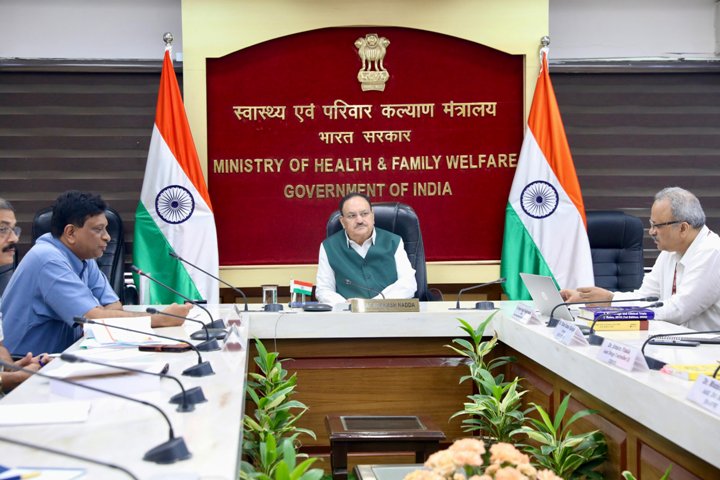J P Nadda Reviews National Emergency Health Readiness Strategy
The Minister was briefed on the current status of emergency preparedness across central government hospitals and healthcare institutions.

- Country:
- India
In a decisive step toward fortifying India’s emergency healthcare infrastructure, Union Health Minister Shri J P Nadda chaired a high-level review meeting with senior officials from the Ministry of Health and Family Welfare. The primary focus of the meeting was to evaluate the preparedness of national emergency health systems and ensure a proactive and seamless response mechanism across all levels of healthcare service delivery.
The Minister was briefed on the current status of emergency preparedness across central government hospitals and healthcare institutions. The presentation covered a wide spectrum of critical areas:
-
Ambulance Deployment: An updated report on the strategic deployment of emergency ambulances across key regions was presented. These ambulances are being equipped with advanced life-saving tools and linked to control rooms to facilitate real-time response coordination.
-
Medical Supply Chain: Emphasis was placed on ensuring an uninterrupted supply of essential medical equipment, drugs, consumables, and blood vials. Efforts are being directed to stock trauma care kits, oxygen cylinders, and other vital medical essentials.
-
Hospital Infrastructure: The preparedness status of hospital beds, Intensive Care Units (ICUs), and High Dependency Units (HDUs) was reviewed. Facilities have been advised to increase capacity and remain on high alert to cater to potential mass casualty events.
-
Mobile Trauma Units: The deployment of BHISHM Cubes and Advanced Mobile Trauma Care Units was also discussed. These mobile medical response units are capable of delivering on-the-spot care in emergency zones, particularly in areas prone to natural disasters or conflict.
National Coordination with Healthcare Institutions
To strengthen collaborative response mechanisms, top-tier institutions such as AIIMS (All India Institute of Medical Sciences), PGIMER (Postgraduate Institute of Medical Education and Research), and JIPMER (Jawaharlal Institute of Postgraduate Medical Education & Research) have mobilised their staff, including doctors and nurses. These institutions are not only prepared for rapid deployment but are also working in coordination with:
-
State and District Administrations
-
Armed Forces Medical Corps
-
Regional Medical Associations
-
Private Hospitals and Charitable Institutions
This multilateral approach is expected to greatly enhance the agility and reach of emergency healthcare delivery, especially in underserved or disaster-prone regions.
Nationwide Disaster Drills and Capacity Building
As part of proactive disaster management, nationwide mock drills have been conducted in major institutions including AIIMS, PGIMER, and JIPMER. These drills simulated various emergency scenarios to test readiness, inter-agency coordination, and infrastructure capacity.
Furthermore, a large-scale capacity-building initiative has been rolled out:
-
Training Modules: Specialised modules for CPR (Cardiopulmonary Resuscitation), Basic Life Support (BLS), and First Aid are being introduced.
-
Collaborating Agencies: Indian Red Cross Society, NIHFW (National Institute of Health & Family Welfare), AIIMS, and the iGOT platform are instrumental in rolling out these training programs across the country.
-
Target Beneficiaries: These trainings will benefit healthcare professionals, first responders, and local volunteers to build a robust grassroots-level emergency response ecosystem.
Directives and Monitoring by the Health Ministry
Union Health Minister Nadda has issued clear directives to ensure all emergency medical systems are always fully functional and that critical ground-level linkages, particularly with state and district health authorities, are reinforced—especially in border states and vulnerable districts.
A 24x7 Control and Command Centre has been instituted within the Ministry to monitor real-time developments, support regional authorities, and coordinate national-level emergency response. This central hub will facilitate swift communication and resource mobilisation in the face of medical emergencies.
Ongoing Commitment to Public Health Resilience
The Union Health Ministry reiterated its unwavering commitment to maintaining uninterrupted healthcare services and emergency response operations across all regions of the country. By integrating a centralized command system with decentralized health institution readiness, the government aims to create a resilient and responsive healthcare framework capable of addressing a wide array of public health crises, from natural disasters to mass casualty events.
With such concerted efforts, India’s health system is poised to provide timely and effective medical response, safeguarding millions during emergencies.










